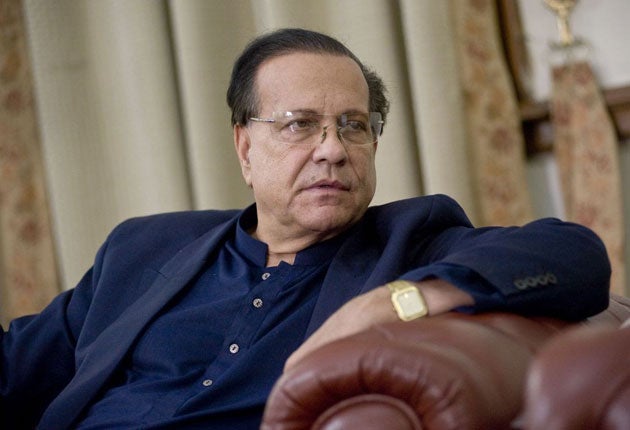Salmaan Taseer: Governor of Punjab and outspoken defender of minority causes

Speaking up for minorities came easy to Salmaan Taseer, the Governor of Punjab who was brutally assassinated by his own bodyguard last Tuesday. Half a century before he took up the cause of Aasia Noreen, a poor Christian woman facing a death sentence for blasphemy that she never committed, Taseer and his childhood friends resolved to protest the death sentence of Jimmy Wilson, a poor African-American.
"It was outrageous that he was going to be hanged for stealing a mere dollar," recalls co-conspirator Tariq Ali, the left-wing writer. Along with a third friend, the teenage subversives mounted a "Free Jimmy Wilson" demonstration to the US Consulate General in Lahore. But halfway there, Ali realised how few of them there were. Shrewdly, Taseer devised a fix. Somehow he swiftly gathered an excitable crowd of street urchins to make up the numbers. "They didn't even know what they were protesting about," says Ali, guffawing at the memory.
The move was typical Taseer. Quick-thinking was a trait that later served him well in business. A passion for loud, defiant political protest saw him take up unpopular causes. And develop a keen sense of humour. In a country where prospects for mobility remain slim, he was a rare example of someone who had risen from a modest background to become one of its most successful businessmen, and later, one of its most notable politicians.
Like Ali, Taseer was born into a prominent Lahore left-wing family. His father, M D Taseer, was a notable progressive poet, who married Christabel George, an English woman. "Christabel and her sister, Alys, came to India in the 1930s to support its struggle for freedom against the British," says Ali. Alys, Salmaan Taseer's aunt, married an even more famous poet, Faiz Ahmed Faiz. After his father died when he was just 10, Faiz bulked large in Taseer's life as a mentor. Without a father, Taseer, his two sisters and their mother, endured straitened circumstances.
Christabel couldn't afford to send her 17-year-old son to university, but bought him a one-way ticket to London. During the day he worked odd jobs to support himself and in the evening he studied chartered accountancy. Taseer seized moments to feed his political curiosity. Living with Faiz, exiled in Britain at the time, he encountered left-wing luminaries like Pablo Neruda, the Chilean poet. When the Vietnam War was raging, he marched on to Grosvenor, behind his old friend Ali.
"When I met Hillary Clinton, I told her that during the Vietnam War I used to hurl stones at the US Embassy in London," Taseer told me at our last meeting, just before Christmas at the Islamabad home near which he was slain. "You know what Clinton said? 'I used to do the same'," he said, flashing the broad, mischievous grin that often filled his face. The US Secretary of State had come to meet him at Governor House, the vast colonial-era mansion where he was buried on Wednesday.
Becoming Governor, traditionally a dreary ceremonial post, was an irony for Taseer. As a teenager, he, Ali and others defaced the walls of Lahore's palatial Governor House with slogans denouncing the military dictatorship of General Ayub Khan. Two decades later, on the orders of General Zia-ul-Haq's governor, Taseer was thrown into the then dictator's dungeons at Lahore Fort for being a leading member of Benazir Bhutto's Pakistan People's Party. For several months, he was kept in solitary confinement, often beaten and deprived of sleep.
"To keep track of the days I used to mark the walls each morning, when a tiny bit of sunlight peeped into the cell," he once told me. But the grim experience, he said, vanquished any fear within him. "I recommend the experience to everyone. It's quite the character-building exercise!" That wryness won him a keen following on Twitter. "A thief stole my credit card a week ago but I didn't report it because I saw he was spending less money than my wife. True!" he once tweeted.
Taseer joined politics after meeting Benazir's father, Zulfikar Ali Bhutto, the former Prime Minister who was toppled in Zia's 1977 coup and hanged two years later. "His youthfulness, his rhetorical powers, his fashionable left-wing views and his fervent Pakistani nationalism all served to captivate me," Taseer wrote in his 1979 biography. Taseer's flamboyant style, the Cuban cigars, slick suits, and outspokenness were plainly inspired by Bhutto. The yellow-tinted glasses, however, some joked, were a tribute to U2's Bono.
After losing the 1993 election, Taseer abandoned politics for many years to focus his energies on building a business empire, with interests in the media, banking and chartered accountancy. The teenage socialist became an ardent capitalist. But while his politics had softened, he never shed his commitment to the rights of minorities. "I am fighting for Jinnah's Pakistan," he would insist, "a liberal and tolerant Pakistan."
As Governor of Punjab, a role he took up in 2008, he was among the first to visit a Christian colony that had been torched by sectarian militants. When the same militants attacked two mosques belonging to the Ahmadi Muslim sect in Lahore, he was savaged by the religious right for expressing solidarity. Supporting Aasia Noreen was only natural for him. Even as the threats mounted and even as his party distanced itself, he remained defiant. After his brutal murder, the fear is that no one will match that bravery again.
Omar Waraich
Salmaan Taseer, businessman and politician: born Shimla, Punjab 31 May 1944; married twice (seven children); died Islamabad 4 January 2011.
Join our commenting forum
Join thought-provoking conversations, follow other Independent readers and see their replies
Comments
Bookmark popover
Removed from bookmarks